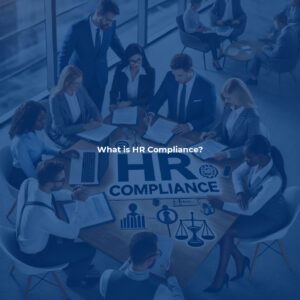HR compliance is the practice of ensuring that a business adheres to federal, state, and local employment laws and regulations. It involves policies and procedures that protect both employees and employers by maintaining a fair and lawful workplace. From hiring practices to employee benefits, HR compliance plays a crucial role in preventing legal risks and fostering a positive work environment.
Why is HR Compliance Important?
Failing to comply with HR regulations can lead to severe penalties, lawsuits, and damage to your company’s reputation. Compliance ensures that businesses:
-
Avoid legal consequences such as fines and lawsuits.
-
Maintain employee trust and satisfaction.
-
Establish clear workplace policies that enhance productivity.
-
Prevent discrimination, harassment, and other workplace issues.
Key Areas of HR Compliance
To stay compliant, businesses must focus on various aspects of HR, including:
1. Employment Laws and Regulations
Businesses must follow federal laws such as:
-
Fair Labor Standards Act (FLSA): Governs minimum wage, overtime, and child labor laws.
-
Equal Employment Opportunity (EEO) Laws: Prohibit discrimination based on race, gender, age, or disability.
-
Family and Medical Leave Act (FMLA): Grants eligible employees job-protected leave for medical or family reasons.
2. Payroll and Wage Compliance
Employers must ensure accurate wage payments, tax withholdings, and overtime calculations according to state and federal laws.
3. Employee Benefits and Compensation
Companies must comply with laws related to health benefits, retirement plans, and paid leave policies, including:
-
Affordable Care Act (ACA) compliance for health insurance requirements.
-
ERISA (Employee Retirement Income Security Act) for retirement plans.
4. Workplace Safety and OSHA Compliance
Businesses must adhere to Occupational Safety and Health Administration (OSHA) standards to provide a safe working environment.
5. Employee Documentation and Record-Keeping
Employers must maintain records for hiring, payroll, performance reviews, and disciplinary actions while ensuring compliance with HIPAA and GDPR regulations where applicable.
6. Anti-Harassment and Discrimination Policies
Companies must establish policies that address workplace harassment and discrimination to foster a safe and inclusive culture.
How Can a PEO Help with HR Compliance?
Managing HR compliance can be overwhelming, especially for small and mid-sized businesses. A Professional Employer Organization (PEO) like NetPEO can help by:
-
Ensuring adherence to employment laws and regulations.
-
Managing payroll, benefits, and tax compliance.
-
Implementing policies to prevent workplace issues.
-
Conducting HR audits and risk assessments.
Stay Compliant and Focus on Growth
HR compliance is essential for protecting your business and employees. Instead of navigating complex regulations alone, partner with NetPEO to streamline your HR processes and reduce compliance risks.
Want to simplify HR compliance for your business? Contact NetPEO today and let our experts handle it for you!

